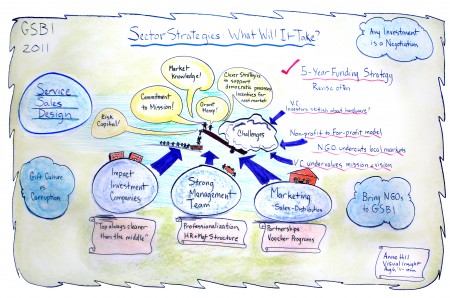Serving the Trillion Dollar BoP Energy Market
Not everyone wants to spend their weekend in a conference room discussing challenges like benchmarking low-cost solar home lighting systems, finding the right business model to get those systems to the people who need them the most, and raising the seed capital to turn those models into reality. But for the 11 social entrepreneurs gathered with experts and the CSTS Clean Energy Sector team, there is no place else we would have rather been.
William Kisaalita of Thermogenn came to the forum and GSBI program to build a business that will enable him to provide off-grid coolers to smallholder dairy farmers in Uganda, increasing their income with a product that will pay for itself in less than a year. He said the best part of the forum was that “seeing all these implementations opened me up to consider new approaches to my own business. And, of course, the inspiration of hearing from Manoj Sinja of Husk Power Systems (GSBI alum, 2009) that he is succeeding despite all the naysayers, even here in Silicon Valley, who told him that he could not make his targets.”
The forum was a prelude to the Global Social Benefit Incubator in-residence program, which began on Sunday, Aug. 7. As part of CSTS’s sector strategy, this year’s class once again has a large representation of entrepreneurs working to bring clean energy to the 1.5 billion people off the grid and clean cooking to the 3 billion people who use inefficient, polluting traditional cookstoves.
The purpose of the forum was to enable everyone to take a step back from the day-to-day challenges of running and growing their ventures, look across the broad sector, and brainstorm together on the question of what will it take to provide the world’s poor with affordable access to clean energy. Al Hammond (CSTS Senior Research Fellow & Ashoka Leadership) commented, “I was impressed by the quality of the class and the degree of cross-learning that started right away. That was satisfying to see because it was one of the reasons for doing sector-focused work. Also, last year we looked hard to find the 10 best clean energy enterprises to bring in-we took the cream off. This year, we found 11 really strong new ones. That says something about how vibrant the rate of innovation is in this sector.”

(Above: Graphic recording of Sector Strategies: ’What will it Take?’ Session. Image credit: GSBI).
The passion and vision of the field-based social entrepreneurs we work with is always invigorating and inspiring. What was most uplifting about this year’s group is that while many are still early stage in their ventures, they have a clear understanding of the landscape and are wisely focusing their efforts on solving one piece of the problem while partnering with others. Even before coming to GSBI, participants had begun to work together. For example, Angaza Designs is selling its best-in-breed lights through Solar Sister’s Avon-style network of African women entrepreneurs. After living and working together over the two-week GSBI program, more such partnerships are sure to evolve, especially since GSBI stresses that entrepreneurs should focus on their core competencies and partner with others to provide a total solution.
To foster these relationships in the sector, CSTS has partnered with Ayllu to create the Energy Map, which profiles 42 clean energy social enterprises. The 11 ventures from this year’s GSBI class will soon be added to the map.
The energy poverty issue is so large and complex that these ventures and others will need to scale quickly to meet demand. The size of the energy market for the BoP was $500 billion in 2006 and, because of increased income levels and aspirations; it is now estimated to be closer to $1 trillion. Existing solutions like the products sold by GSBI participants provide better, cleaner, safer, and cheaper energy than traditional sources, including kerosene and disposable batteries. Yet, because of the distinct cultural, geographic, and regulatory complexities of each market, penetration has been slow. The forum’s investment readiness panel addressed this, featuring CSTS’s John Kohler along with Gina Rodolico of E+Co and Raul Pomares of Springcreek Global Investments. The group stressed that financial-first and impact-first investors can co-exist and that each has a role to play in taking innovations to scale.
The 11 clean energy entrepreneurs have now been joined by seven other entrepreneurs working in health, economic development, and other sectors for the core GSBI program. You are invited to meet them all and hear their plans at the Aug. 18, GSBI Business Plan Presentations event at Santa Clara University.
Please like NextBillion on Facebook, follow us on Twitter and/or join our LinkedIn group.
- Categories
- Energy, Environment
